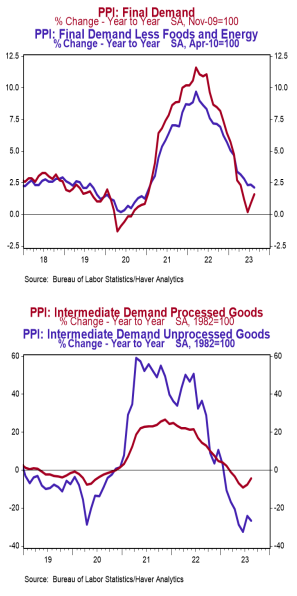- The Producer Price Index (PPI) rose 0.7% in August, coming in well above the consensus expected +0.4%. Producer prices are up 1.6% versus a year ago.
- Energy prices rose 10.5% in August, while food prices declined 0.5%. Producer prices excluding food and energy rose 0.2% in August and are up 2.2% versus a year ago.
- In the past year, prices for goods are up 0.5%, while prices for services have risen 2.2%. Private capital equipment prices rose 0.4% in August and are up 2.1% in the past year.
- Prices for intermediate processed goods rose 2.1% in August but are down 4.3% versus a year ago. Prices for intermediate unprocessed goods rose 1.3% in August but are down 26.9% versus a year ago.
Implications:
Producer prices jumped 0.7% in August following a large rise in July, reminding the Fed that the inflation fight is still far from over. As you can see from the nearby chart, the year-ago comparison for producer prices, now up 1.6%, has fallen considerably since the 11.7% peak in March 2022. Keep in mind, though, that much of the moderation is due to outsized jumps in inflation immediately after the invasion of Ukraine last year, which are now rolling off year-ago calculations, and inflation has re-accelerated of late, with producer prices up 4.3% at an annualized rate in the last three months. Taking a look at the details of today’s report shows that “core” prices – which excludes the typically volatile food and energy components – rose 0.2% in August and are up 2.2% in the past year. The goods sector led prices higher in August, rising 2.0% on the back of surging energy costs. Strip out energy, and goods prices would have been flat on the month. Services prices rose 0.2% in August as higher costs for transportation and warehousing were tempered by a decline in margins received by wholesalers. Prices further back in the pipeline suggest final goods inflation will likely fall in the months ahead. Prices for intermediate demand processed goods rose 2.1% in August, but are down 4.3% in the past year, while unprocessed goods prices rose 1.3% in August but are down 26.9% in the past year. While modest core inflation readings are welcome, data from yesterday’s CPI report reiterates that the Fed hasn’t reached the finish line. When the Fed meets next week, they will most likely keep rates unchanged, but we expect they will make clear that a further hike remains on the table. The economy is in the grip of a battle between the ongoing impacts from the tsunami of money that hit the system in 2020-2021 and is still being absorbed, while at the same time starting to show signs of the riptide from the Fed and Treasury Department pulling money out of the system in the past year. Economic growth remains positive, but we still believe a recession is on the horizon. How the Fed will respond if/when a recession appears is very much an open question. The Fed’s failures in the 1970s should be a stark reminder of the painful results of easing before the battle against inflation is fully won.





